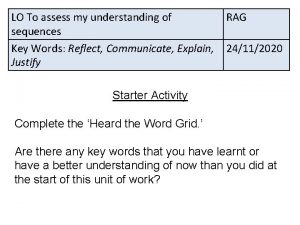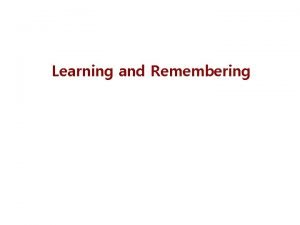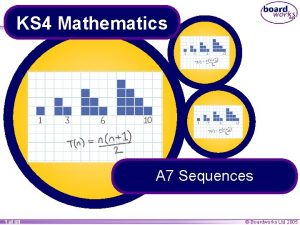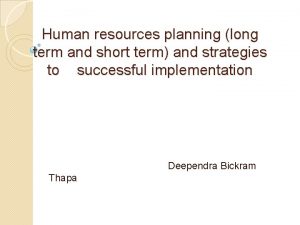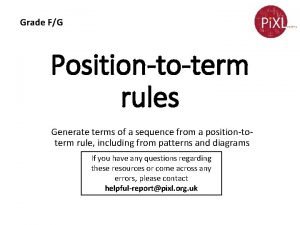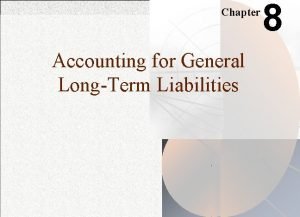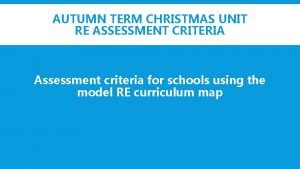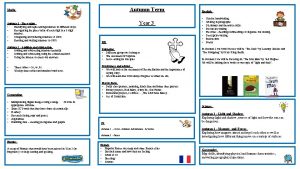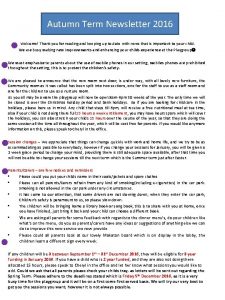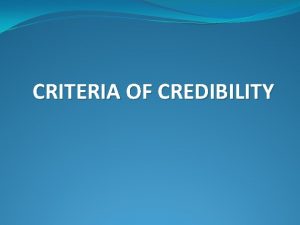AUTUMN TERM 2A RE ASSESSMENT CRITERIA Assessment criteria







- Slides: 7

AUTUMN TERM 2(A) RE ASSESSMENT CRITERIA Assessment criteria for schools using the model RE curriculum map

Year 1: Big question: Why are saints important to Christians? Week 1: What makes a saint? Week 2: How can the example of a saint help a Christian with how to live their life today? Remembering • • • To know what makes someone a Saint. To know how someone becomes a Saint. To know how the Bible defines a Saint. To know the significance and meaning behind All Saints Day. To know how a Saint can influence the lives of Christians today. Religious vocabulary • • • Christian God Saint The Church Holy Sanctified Bible Martyr All Saints Day What enquiry based questions do they need to be able to answer by the end of the unit? Beliefs, teachings, sources of wisdom and authority: • I can talk about what makes someone a Saint. (WT) • I can retell the story linked to a Saint and talk about it. (Exp) • I can retell the story of a Saint and say what a Christian can learn from the story. (GD) Questions of meaning, purpose and truth: • I can say how I feel. (WT) • I can think about times when I have shown the qualities of a Saint. (Exp) • I can talk about the stories linked with a Saint and ask questions about the Saint’s life. (GD)

Year 2: Big question: Who is the Saint of our school/what is the story of our school name? Week 1: Teacher to plan the focus. Week 2: Teacher to plan the focus. Remembering Religious vocabulary What enquiry based questions do they need to be able to answer by the end of the unit? • To know the story of the school Saint/story behind the school name. • To know the Saint day for the Saint. • To know the Saint’s symbol and the meaning behind the symbol. • To know the beliefs of the Saint. • To know how the Saint lived their life and showed their commitment to the Christian Faith. • To know how the Saint can influence the life of believers today. • Saint’s Day • Patronal festival • Parish church • Dedicate • Christianity • Faith • Beliefs • Symbol • Way of life • Teachings • Purpose • Value • Commitment Beliefs, teachings, sources of wisdom and authority: • I can retell the story linked to our Saint/school name and talk about it. (WT) • I can retell the story linked to our Saint/school name and suggest what it means. (Exp) • I can begin to describe what a believer might learn from the story of the Saint/school name. (GD) Ways of expressing meaning: • I can recognise what a symbol is and talk about it. (WT) • I can recognise that a Saint’s actions and words express what they believe and how they choose to live their life. (Exp) • I can use religious vocabulary to describe how the Saint expressed their beliefs in the way they lived their life. (GD)

Year 3: Big question: Why is remembrance important? Week 1: Why is it important to remember? Week 2: How does remembering help the cause of peace? Remembering • • To understand the importance of remembering. To know about the feast days of ‘All Saints Day’ and ‘All Souls Day’ as days the church mark for remembering. To understand how the importance of remembering and reflecting helps leads towards peace. To understand the importance of peace to believers and how this might be expressed by people of faith. (Peace of God, Shalom (Hebrew – Peace, harmony), Salaam-Alaikum (Arabic – Peace be unto you) Religious vocabulary • • • Remembrance Remembering All Souls Day All Saints Day War Conflict, Symbol Poppy White poppy Hope Peacemaker, What enquiry based questions do they need to be able to answer by the end of the unit? Ways of expressing meaning: • I can recognise that religious symbols, words and actions express how a community might choose to remember. (WT) • I can use religious vocabulary to describe some of the different ways communities express ways of remembering. (Exp) • I can express what the importance of remembering and fighting for the cause of peace might mean for a believer and how they might express it through different medias – eg services, campaigns, wearing a symbol. (GD) Questions of values and commitments: • I can begin to express my own ideas and opinions about remembering and peace. (WT) • I can link things that are important to me with the way I think and behave. (Exp) • I can begin to ask questions about the moral decisions I make with particular reference to what I feel about remembering and fighting for the cause of peace and the decisions people of faith make. (GD)

Year 4: Big question: What are the Beatitudes and what do they mean to Christians? Week 1: What are the Beatitudes? Week 2: What do the Beatitudes mean to Christians? Remembering • • • To know the core concept: Gospel. To understand the Sermon on the Mount. To know what the Beatitudes mean. To know what impact the Beatitudes had at the time. To know what the Beatitudes mean for Christians today? To know what the Beatitudes tell us about God, Jesus, humanity and our responsibilities to each other and the world? Religious vocabulary • • Christian God Jesus Beatitude Blessing Mount of Olives Moral decisions What enquiry based questions do they need to be able to answer by the end of the unit? Beliefs, teachings, sources of wisdom and authority: • I can describe what a Christian might learn from the Beatitudes and reflect and respond thoughtfully. (WT) • I can make links between the Jesus’ teachings and how they are connected to a believer’s life. (Exp) • I can begin to suggest reasons for how a sacred text can be used to provide important answers to important questions about life and morality. (GD) Questions of values and commitments: • I can link things that are important to me and other people with the way I think and behave. (WT) • I can confidently ask questions about the moral decisions I make and suggest what might happen as a result of a different decision, including making references to the Beatitudes. (Exp) • I can begin to apply and express my own ideas about ethical question including ideas about what is right and wrong and what is fair and just. (GD)

Year 5: Big question: What can we learn from Wisdom? Week 1: Why is wisdom important? Week 2: What wisdom can you offer and from where does this wisdom come? Remembering • • To understand the meaning of wisdom To know where wisdom comes from To know the importance of wisdom To understand what the book of Proverbs tells us about wisdom Religious vocabulary • • • Wisdom Wise Teachings Source The Bible Sacred writings Book of Proverbs Proverb Quote What enquiry based questions do they need to be able to answer by the end of the unit? Beliefs, teachings and sources of wisdom and authority: • I can make links between different faiths and the sources they might go to, to find wisdom andbegin to show they are connected to believers lives. (WT) • I can suggest reasons for the similar and different beliefs people hold and explain how sacred texts can provide answers to important questions about life and morality. (Exp) • I can say what the Book of Proverbs teaches about wisdom and explain how this might be different to another sacred text which leads to the diversity of opinion amongst people. (GD) Questions of meaning, purpose and truth: • I can begin to apply my own and others ideas’ to a given question and support my views using facts and evidence – ie the Book of Proverbs to support my views. (WT) • I can ask questions about what wisdom means and suggest answers which relate to the search for truth in our lives. (Exp) • I can give reasoned examples that express insight into my own and others’ views about big questions about the meaning and purpose of life and the search for truth – particularly related to wisdom. (GD)

Year 6 : Big question: Should every Christian go on a pilgrimage? Week 1: What is a pilgrimage? Week 2: What is more important for Christians, the journey or the destination? Remembering • • Religious vocabulary Journey Pilgrimage Pilgrim Faith Place Inspire Influence Sacred Spiritual Devotion Connection, Canterbury Walsingham Iona Taizé Lourdes Rome The Holy Land. What enquiry based questions do they need to be able to answer by the end of the unit? Ways of living: • I can use the correct religious vocabulary to describe the practices associated with going on a Christian pilgrimage. (WT) • I can explain why for some Christians going on a pilgrimage is a significant part of their Christian life. (Exp) • I can show understanding by making links between belief and how a Christian chooses to live their life – eg how going on a pilgrimage is an expression of belief. (GD) Questions of identity, diversity and belonging: • I can articulate my own understanding of belonging and commitment and relate this to people who have influenced me. (WT) • I can apply my own ideas about how being on a pilgrimage creates a sense of belonging to a Christian community. (Exp) • I can consider the challenging of belonging to a religion today and consider how Holy Sites and pilgrimages impact on individuals and the lives of communities. (GD) To know what is meant by a Christian pilgrimage. To know the difference between sacred and special. To understand from a Christian perspective what the experience is like before, during and after a pilgrimage. To understand the importance of a physical and spiritual journey for a Christian.

